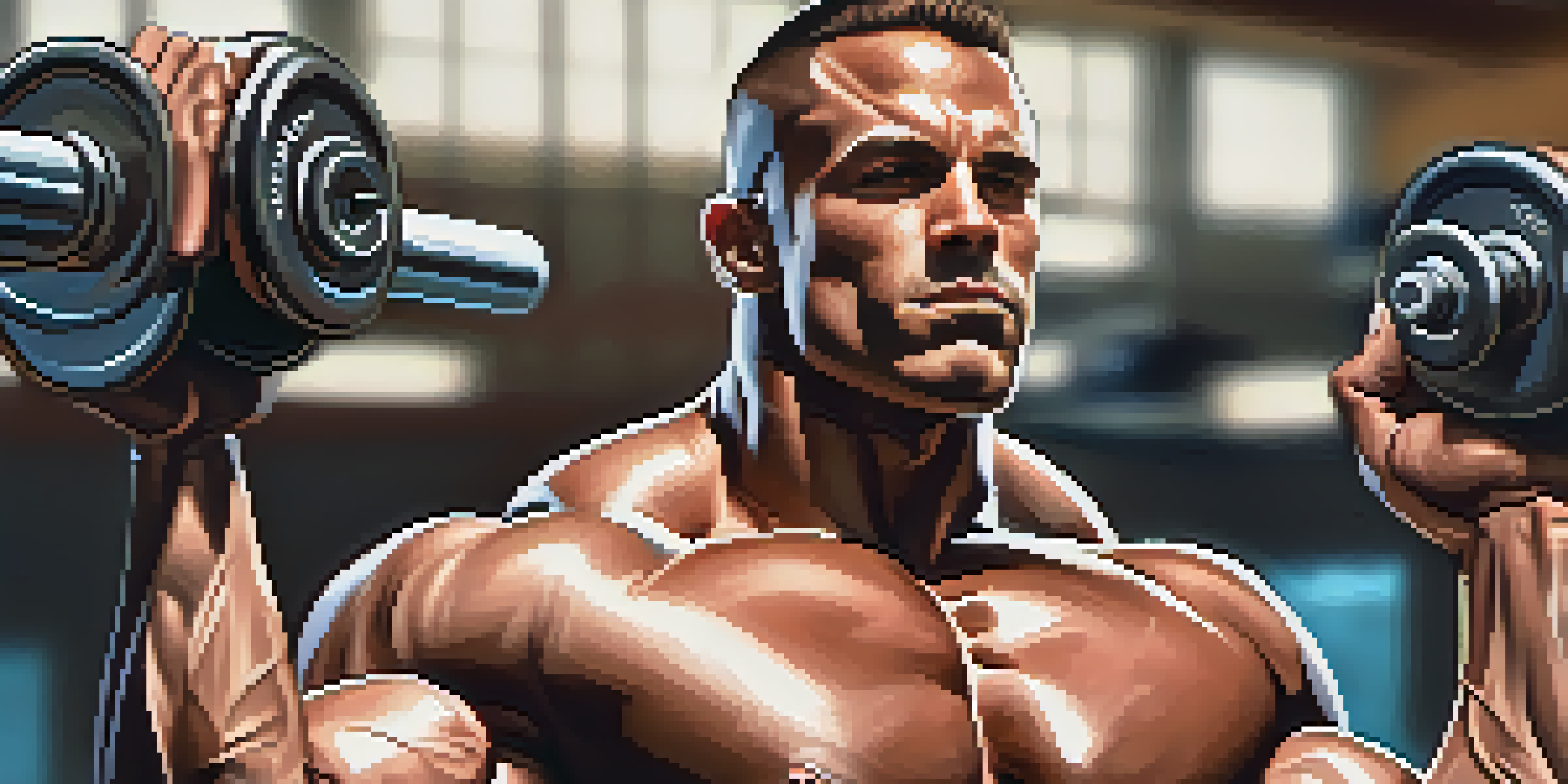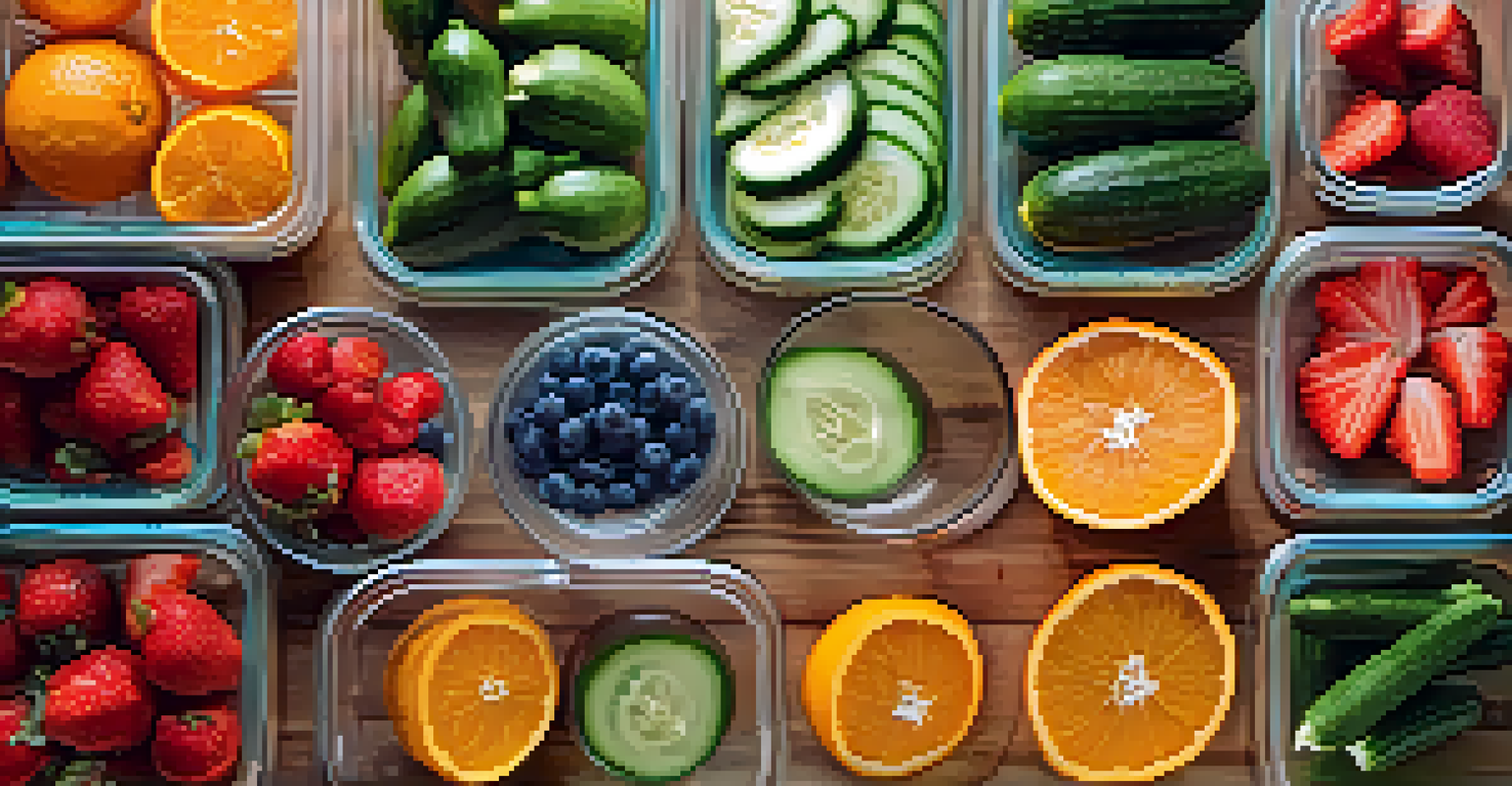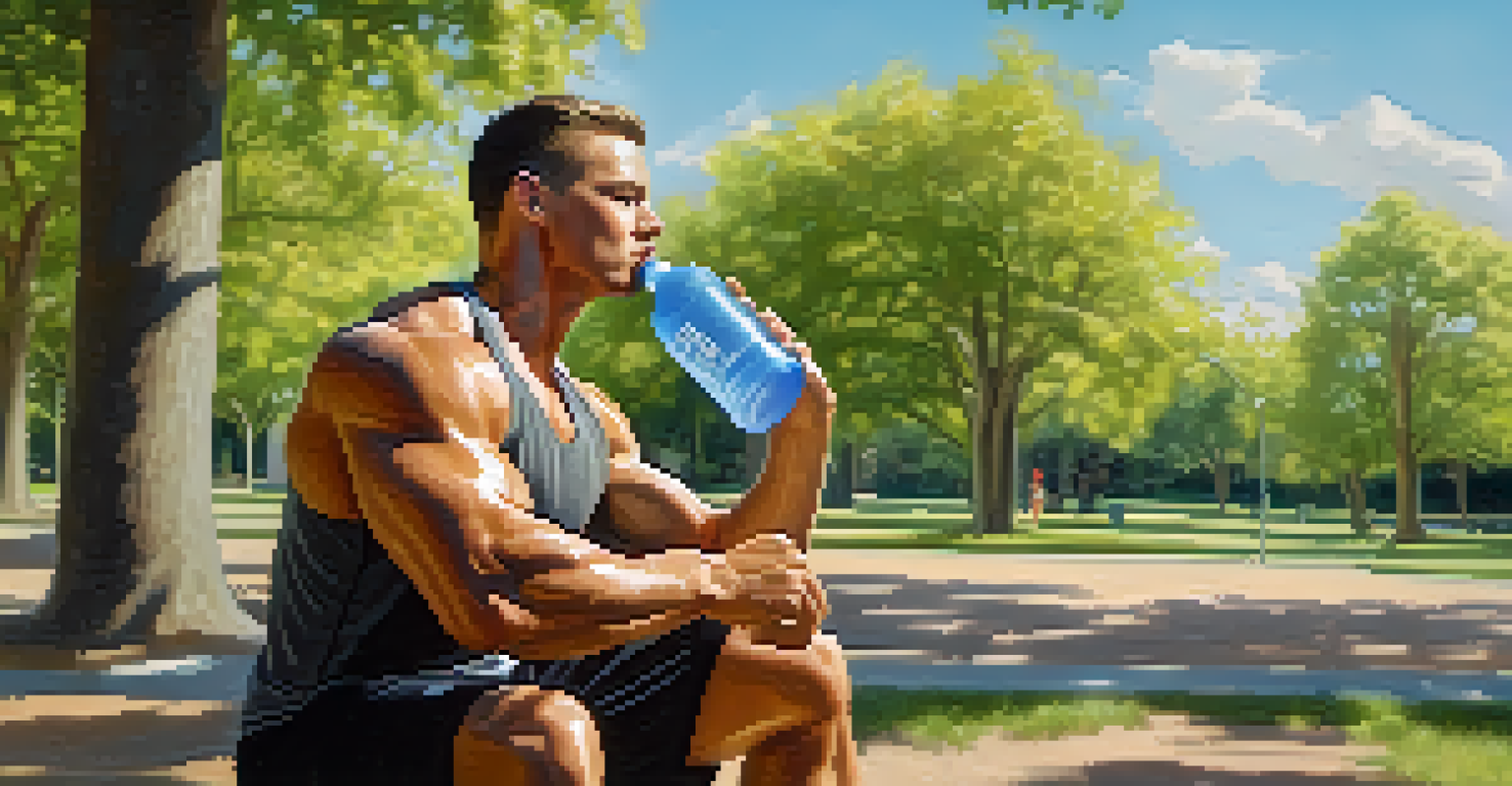Hydration Strategies for Bodybuilders During Training

The Importance of Hydration for Bodybuilders
Hydration is a crucial element for bodybuilders, affecting both performance and recovery. When you’re lifting heavy weights or engaging in intense training sessions, your body loses fluids through sweat. This fluid loss can lead to dehydration, which may hinder your strength, endurance, and overall progress in the gym.
Water is the source of life, and without it, we cannot function at our best.
Dehydration can also impact your muscles' ability to recover, making it more challenging to build the muscle mass you desire. Think of hydration like oil for a well-tuned machine; without it, everything can grind to a halt. Therefore, understanding how to maintain optimal hydration levels is essential for anyone serious about bodybuilding.
Moreover, staying hydrated helps regulate body temperature and maintains electrolyte balance, both of which are vital during strenuous workouts. So, let’s dive into some effective hydration strategies that can keep you at the top of your game.
Understanding Your Hydration Needs
Each bodybuilder has unique hydration needs based on factors like weight, workout intensity, and climate. A general rule of thumb is to drink at least half your body weight in ounces daily, but this can vary. For example, a 200-pound bodybuilder might aim for around 100 ounces of water, or more if they sweat heavily during workouts.

To get a more personalized approach, consider tracking your fluid intake and monitoring your body’s response. Pay attention to signs of dehydration such as dark urine, fatigue, or headaches. Keeping a hydration log can help you discover your individual needs and make adjustments as necessary.
Hydration Boosts Performance
Staying hydrated is essential for bodybuilders, as it directly influences strength, endurance, and recovery.
Remember, hydration isn’t just about water; it also includes any fluids consumed through food, like fruits and vegetables. So, while you’re lifting those weights, be mindful of how much you’re drinking and how it aligns with your training regimen.
Timing Your Hydration: Before, During, and After Training
Timing is everything when it comes to hydration. For optimal performance, it’s best to start hydrating before your workout. Aim to drink about 16-20 ounces of water at least two hours before you hit the gym. This pre-hydration sets you up for success and ensures your body is ready to tackle that workout.
The body is a temple, and it must be nourished and cared for properly.
During your training, drink water regularly, especially if your session lasts longer than an hour. A good rule of thumb is to sip on 7-10 ounces every 10-20 minutes. If you’re engaging in high-intensity workouts, consider a sports drink that replenishes electrolytes lost through sweat.
Finally, post-workout hydration is crucial for recovery. Aim to replenish any lost fluids by drinking 16-24 ounces of water for every pound lost during your training. This helps kickstart the recovery process, allowing your muscles to repair and grow effectively.
Choosing the Right Hydration Beverages
While water is your best friend, sometimes your body craves something extra. For high-intensity workouts, consider electrolyte-rich beverages to help replace what you’ve lost. Sports drinks can provide a great balance of carbs and electrolytes, which can enhance endurance during longer training sessions.
However, be wary of sugar content in some sports drinks; they can sometimes be loaded with unnecessary sugars. Look for options that offer lower sugar levels or opt for natural sources like coconut water, which provides hydration along with electrolytes.
Recognize Dehydration Signs
Being aware of dehydration symptoms, like dark urine and fatigue, helps bodybuilders maintain optimal performance.
Another option is homemade electrolyte drinks. A simple mix of water, a pinch of salt, and some lemon juice can do wonders. This way, you have full control over your hydration choices, ensuring they align with your bodybuilding goals.
Signs of Dehydration: What to Watch For
Recognizing the signs of dehydration is essential for any bodybuilder. Common symptoms include dry mouth, fatigue, dizziness, and decreased performance. If you notice these signs creeping in during your workout, it may be time to pause and hydrate.
Another important indicator is the color of your urine. A pale yellow color typically indicates good hydration, while dark yellow or amber signifies dehydration. This simple visual cue can help you gauge your fluid levels throughout the day.
Listening to your body is key. If you’re feeling sluggish or your muscles are cramping, these could be signals that you need to drink more fluids. Staying attuned to these signs can help you maintain peak performance and avoid setbacks in your training.
Hydration and Nutrition: A Perfect Pair
Hydration doesn’t exist in a vacuum; it works hand-in-hand with nutrition. Consuming foods high in water content, such as cucumbers, oranges, and strawberries can boost your hydration levels. These foods not only hydrate but also provide essential nutrients that support muscle recovery.
Moreover, certain nutrients play a crucial role in hydration. Electrolytes like sodium, potassium, and magnesium help maintain fluid balance in your body. Including foods rich in these electrolytes, such as bananas and leafy greens, can enhance your hydration strategy.
Food and Hydration Work Together
Incorporating hydration-friendly foods rich in water and electrolytes can enhance your overall hydration strategy.
So, while you’re planning your meals, don’t forget to include hydration-friendly foods. This balanced approach will not only help you stay hydrated but also support your overall bodybuilding goals.
Adjusting Hydration for Different Conditions
Your hydration strategy may need to change based on different conditions, such as climate or workout intensity. For example, during hot and humid weather, your body loses more fluids through sweat, so you’ll need to increase your water intake. In contrast, during cooler months, your body might not feel as thirsty, but hydration is still equally important.
Additionally, if you’re training at higher altitudes, your body may require more fluids as the air tends to be drier. Being aware of these environmental factors can help you adjust your hydration strategy accordingly.

Ultimately, the key is to listen to your body and adapt to its needs. Whether it’s a scorching summer day or a chilly winter morning, ensuring you’re properly hydrated will keep you performing at your best.